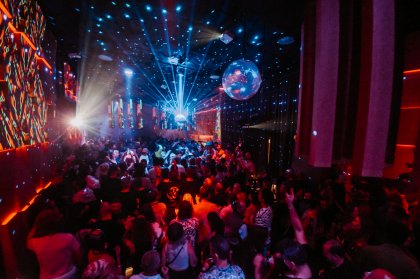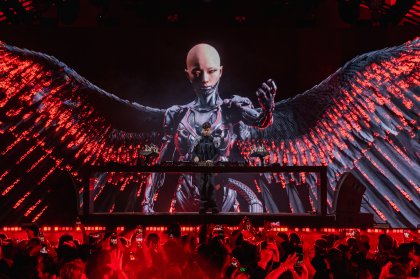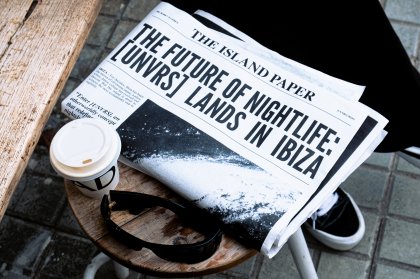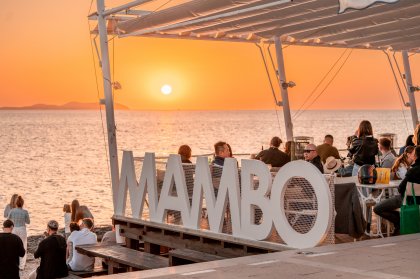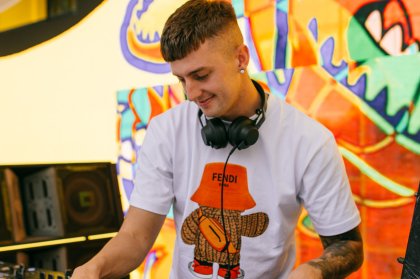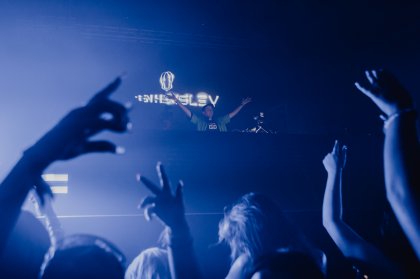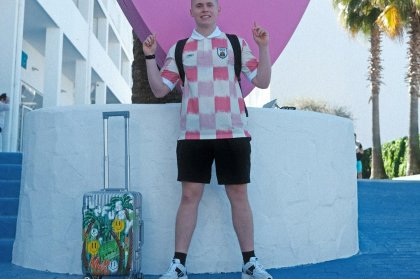
In music record labels come and go, not least if we're talking about house, techno, and the associated subgenres and siblings therein. Only the strong survive in this world, and this is taking on an ever more literal meaning as overheads increase and sales continue to falter.
Officially born as an imprint in 1997, NRK has ridden some of the highest and lowest waves in the history of dance music. The recent label compilation, Forever Underground, charts these eras through releases dating from those formative days to recent times. Sadly, it also marks its last milestone, as soon the doors will be closed for the last time, bringing an end to both a Bristol and British institution.
It's an interesting decision on the part of lone leader Nick Harris, given the sounds most associated with this label are rather en vogue in the post-minimal club scene. In short, amidst the most popular days deep four fours have experienced in decades one of the most consistent exponents prepares to call it a day, so we gave the bossman a call to discuss exactly why this is all happening now, and where we're supposed to go from here. These are his thoughts on the matter.
Hi Nick, thanks for your time. So then, why close NRK at this point, after 15 years in the game?
“Well NRK as a name is probably almost 20 years old really. We started in 1993 as a booking agency, and then quickly built up a roster that reflected the house renaissance of the time. In Chicago stuff like Release Records was suddenly blowing up with all these new artists- maybe not new to Chicago but certainly new to Europe.
“So we immediately began forming relationships with people like Derrick Carter, Gemini, and Boo Williams. At the same time a similar thing was going on in Detroit, so we had guys like Mike Huckaby. Then in Toronto things were getting huge, and we were working with John Acquaviva, Nick Holder, Richie Hawtin.
“In Europe Ian Pooley was one of our guys, and then UK-wise there were all these club nights like Hard Times coming through, so we had Miles and Elliot on the roster, Ralph Lawson with the Back II Basics angle… Basically NRK began life during a very good time for the scene as a whole. It might have come through in1987 or whatever, but by about 1990 house music was in a bit of a mess in Britain, where rave had taken over. Then in 1993 there was this sort of second or third wave.
“From there it built, so eventually we had so much new music being opened up to us- Carl Craig, Angel Moraes, Kenny Carpenter, Dimitri From Paris, we had a lot of DJs pass through the doors, so to speak. So it was a no-brainer to start the label, and promo'd the first record in 1996, releasing it in 1997, which is where the 15-year timeline comes in.
“In terms of why I'm finishing it now, well it's not been an easy decision to make. NRK is a very personal thing to me now, I run it alone, but in our peak we had a few of us on board, a much larger operation. Now the industry has changed, so has the set up. A lot goes through your mind running a label that's almost older than some of the people getting into the music these days.
“Last year I was aware of the fact it was coming up to 15 years, and had planned for a compilation. Originally we were thinking about maybe getting the catalogue remixed, but then I thought everyone does that. Does the world in 2012 need another set of rehashed old tracks?
“So I decided not to do that, and instead just release a retrospective album. And it was whilst I was getting things together for this, listening to everything from the first release to the last, that I decided to retire the label. 15 years is a long time for an independent, and it seemed right to stop things now, like the old cliché says, it's better to go out on a high. Even now I wonder if it's the right decision, and people have asked me ‘why now, when deep house and deep techno are back?'
“But I think NRK has been consistent even when nobody wanted to hear that kind of sound. House music was a dirty word five or six years ago, and people were kind of like ‘NRK, are they still around? Are they still releasing deep house music?' I'd rather finish it now than have to steer the label through another one of those times, which will happen again.”
Do you think there will still be a place for traditional labels in the future then?
“Well, what I will say is that there's certainly not a 15 year shelf life on a label. Planet E, Drumcode, Freerange, 2020 Vision; all those are still doing very well. But what I have seen happen, which I never embraced and is a key reason why I think it's right to retire NRK now, is the whole events side of things. Labels seem to need to put on nights to keep the connection with their audience now.
“I've never been inclined to do that, as the bare facts are a lot of events lose money. I don't want to go under losing thousands by putting on an underground warehouse party in East London. It's hard enough to keep a label going these days, so what used to be losing just one 12”'s profit can finish you now.
“Whether there will still be labels in the traditional sense, well I've always thought new labels will always do well if those responsible are passionate enough, they research and figure out how to do it properly. If that happens things can go great, because they'll be new to the spotlight and can stay in it with momentum. But then there's a drop, there always will be because something new always comes along- it's not the label's fault, it's just that things have moved on.
“Then the hardwork really begins, and now if you're slipping out of the top 100 then it's going to be getting towards hobby label stages really. I've seen the sales reports from some of the labels I have released on, and it just makes you think ‘wow, no wonder we're in a position where labels are just throwing as much as they can at the scene in order to try and better their situation'. I suppose in some ways the music is like porn now, people aren't thinking about it in the same way a label did 20 years ago, and it's not really working for everyone.”
So what's next for you then?
“Well there's still plenty going on. NRK has a few projects to work through, Ed Davenport's album arrived recently, and the reaction to that was great. So there are some remixes and vinyl samplers coming out from that. Also the Forever Underground compilation is just out, so there's all that for starters.
“There are also some parts of NRK that will move forward. The Lab mix series is one, which started in 2009 with Loco Dice, then Steve Bug in 2010, Seth Troxler last year… So this year's is from Paul Woolford, who's a very dear friend of mine, and really the right DJ for the job. It's all about people that are pushing the envelope, like Seth's mix had some really crazy music on it in my opinion, trippy, psychedelic stuff.
“What Paul's doing at the moment has kind of realigned himself, musically, though that's nothing new for him as I know his background and what he's into. For me it's no surprise he's forwarding this new style that's part techno, part broken beat, a bit Chicago, a bit soul. Anyway, that release is out in June.
“I also have a new label called Stoned Immaculate, which began earlier this year. This is my label for releasing my stuff, and it's been getting some great reactions so far from people like Luciano and Sneak. It's very much that kind of uncomplicated house sound. On top of that there's also the Leviathan Sounds imprint, which is more focused on trippier sounds, so the latest release on that just came from Dan Curtin- both of those will continue.
“And, finally, I also have a third label which I don't talk about. It's a techno outlet, and I'm enjoying the fact nobody knows where the music is coming from. On top of this production-wise things are going well, I just had a track out on Steve Bug's Poker Flat compilation, and I'm determined to continue looking at various styles. I guess it's a case of me coming out from the shadows of NRK really.”

